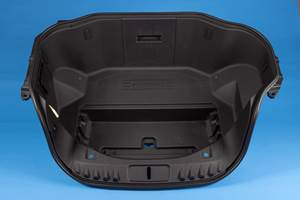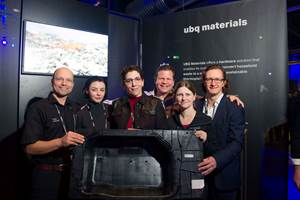Celanese to ‘Shine’ at CES 2023 with Expanded Portfolio of Materials
With it acquisition of DuPont’s engineering resins, Celanese’s resin solutions for automotive electrification, e-mobility and consumer electronics are plentiful.

Photo Credit: Celanese
Celanese Engineered Materials will showcase an expanded portfolio of polymer solutions for automotive electrification, e-mobility, consumer electronics, and smart electronic devices at CES 2023, the show owned and produced by the Consumer Technology Association (CTA) and held each January in Las Vegas. (Jan., 5-8 this year.) Celanese has expanded its Engineered Materials business with the November 1, 2022, acquisition of Mobility and Materials (M&M) brands from DuPont, which include:
▪ Crastin PBT
▪ Hytrel TPC-ET thermoplastic elastomers (TPE)
▪ Melinex and Mylar polyester films
▪ Micromax thick film pastes, inks, and tapes
▪ Rynite PET
▪ Vamac ethylene acrylic elastomers (AEM)
▪ Zytel nylonS 6, 66. 610 and 612
▪ Zytel HTN high performance PPA
▪ Zytel LCPA long-chain nylon
Trailblazing applications enabled by specialized Celanese Engineered Materials polymers that will be on display in the Celanese Innovation Showroom ranged from e-bikes, wireless electric vehicle (EV) chargers, and hybrid EV battery cooling plates to LIDAR-based smart vacuums.
In the advanced mobility category, Celanese materials excel at reducing weight without compromising performance. Specific material performance requirements by application are as follows:
▪ E-bikes consist of multiple components, from structural elements and saddles to e-motors and gears. Materials serving these needs include Hytrel TPC-ET for flex fatigue, wear, and abrasion resistance; Zytel nylons for metal replacement, structural support, and high-temperature resistance; Zytel HTN PPA for structural support, ultra-high-temperature resistance, stiffness, and dimensional stability; Zytel LCPA (flexible) for thermal, chemical, and hydrolysis resistance; Crastin PBT for superior flow, halogen-free flame retardancy, hydrolysis resistance, electrical properties, and processability; and Rynite PET for dimensional stability and durability.
▪ ADAS brackets present demanding requirements for impact resistance, especially when they hold safety sensors and cameras that increase pedestrian safety. Celanese developed a laser-markable Zytel nylon material that meets performance targets, reduces assembly time and reduces cost for global automotive component manufacturer Nifco. The result – a lighter and pre-aimed bracket – will be on display at CES.
▪ EV batteries face three key challenges – energy density, which affects range; manufacturing complexity, which affects production cost; and thermal management, which is required for performance and safety. Celanese developed a hybrid cooling plate that improves thermal management. In addition, the company has introduced a novel 3-in-1 battery concept that increases energy density by consolidating functional parts into a modular system. Together with customer VMAX New Energy, Celanese is also helping to bring wireless EV charging technology to the market. Solutions include Zytel nylons, Zytel HTN PPA, and a new chemical bonding technology for joining aluminum and polyamide.
▪ EV motor mounts can create a quieter interior experience by isolating and damping high-frequency motor noise, which becomes more prominent with quieter EVs. Zytel NVH, a structural material that can be tuned to reduce specific frequencies, received recognition from Automotive News as a PACE award finalist in Cadillac Lyriq motor mounts. It noticeably lowers noise levels and increases passenger comfort.
New products in the consumer electronics segment need a mixture of electrical compatibility, aesthetics, and resistance - to heat, assembly methods, and impact. At CES 2023, Celanese will demonstrate successful products featuring the following material solutions:
▪ Polymeric heat sinks are a workhorse in consumer electronics that need to stay cool while being lightweight. Next generation CoolPoly TCP E3629 (thermally conductive polymers) provide as much as 200 times the thermal conductivity of conventional plastics, while also improving UV resistance, impact strength, and toughness. They also provide a 40% weight savings versus aluminum.
▪ Robotic vacuum cleaners need not only a stylish appearance but also LIDAR-transparent materials that can support smart-sensor designs. A global robot vacuum manufacturer chose Zytel RS, a renewably sourced nylon with 65% biomass, for the LIDAR cover on its smart vacuum. The material features a vivid white color with superior mechanical performance and dimensional stability.
Related Content
Automotive Awards Highlight ‘Firsts,’ Emerging Technologies
Annual SPE event recognizes sustainability as a major theme.
Read MoreCarbon Fiber Reinforced Nylon 12 for Injection Molding
CRP Technology’s new composite is 100% recycled from Windform XT 2.0 IMG industrial 3D printing material.
Read MoreHonda Now Exploring UBQ’s Biobased Material Made from Unsorted Household Waste
UBQ is aiming to expand its reach for more sustainable automotive parts as well as non-automotive applications.
Read MorePEEK for Monolayer E-Motor Magnet Wire Insulation
Solvay’s KetaSpire KT-857 PEEK extrusion compound eliminates adhesion and sustainability constraints of conventional PEEK or enamel insulation processes.
Read MoreRead Next
People 4.0 – How to Get Buy-In from Your Staff for Industry 4.0 Systems
Implementing a production monitoring system as the foundation of a ‘smart factory’ is about integrating people with new technology as much as it is about integrating machines and computers. Here are tips from a company that has gone through the process.
Read MoreBeyond Prototypes: 8 Ways the Plastics Industry Is Using 3D Printing
Plastics processors are finding applications for 3D printing around the plant and across the supply chain. Here are 8 examples to look for at NPE2024.
Read More
























